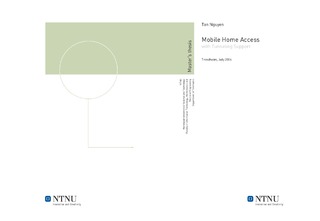Mobile Home Access: with Tunneling Support
Master thesis
Permanent lenke
http://hdl.handle.net/11250/261904Utgivelsesdato
2006Metadata
Vis full innførselSamlinger
Sammendrag
Mobile phones and electronic gadgets on the market today have become more and more powerful, in both processing power and functionalities. Accessing files and documents residing at users home networks via a vast amount of devices is therefore anticipated. The current solution to remote home access, i.e. Virtual Private Network (VPN), is not supported on all different types of devices. In particular, limited processing power and memory footprint on mobile devices such as PDAs and cell phones are not suitable for VPN clients that require high processing power during encryption and decryption of data. In addition, setting up VPN on home network is not a straight-forward task that anyone can complete. Regular users do not have knowledge to set up and configure VPN correctly. It is obviously that we need another approach/method to access home network in an easier manner. The specified system, Mobile Home Access, will provide ubiquitous access to the home network independent of network infrastructures, platforms and terminals. This goal has many challenges and obstacles, such as firewall and routing issues as well as compatibility and the restrictions of the well-known networked file system, i.e. Common Internet File System (CIFS). Based on the previous research project, Mobile Home Access will be implemented as web services and written in Java, the platform independent programming language. XML web services offers intercommunication between applications and protocols running on various network infrastructure. Using web services, the networked file system s services can be exposed to remote clients. The system will operate in two different modes, the reduced-mapping mode for restricted clients (mobile phones, PDA, etc) and the tunneling mode for rich clients (desktop computers, laptop, etc). This thesis will address and try to overcome challenges associated with the tunneling mode in addition to the design of the overall system.
